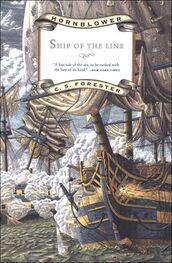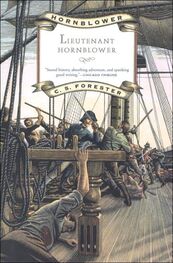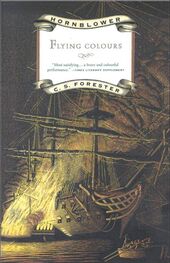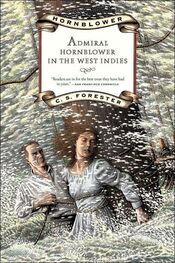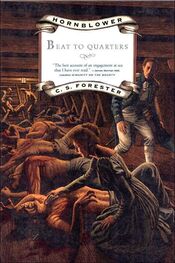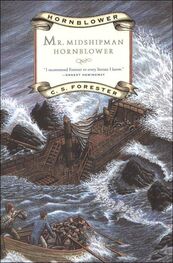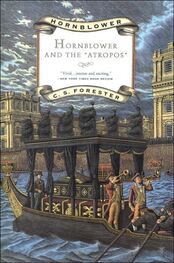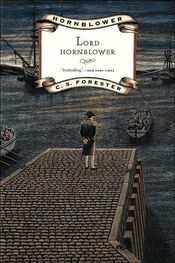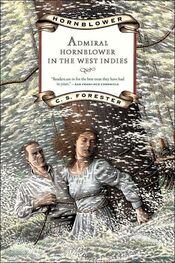The cutter pulled steadily over to the Téméraire .
“ Lydia ,” shouted the coxswain in reply to the hail from her deck, and he held up four fingers which indicated the presence in the boat of a captain as a warning for them to prepare the correct ceremonial.
Sir James Saumarez received Hornblower in the quarter gallery of his flagship. He was tall and spare, of youthful appearance until he took off his hat and revealed his snow-white hair. He listened courteously to Hornblower’s brief explanation of his presence; after forty years at sea and sixteen years of continuous warfare he could guess at the wild adventures which remained undescribed in Hornblower’s verbal report. There was a gleam of approval in his fierce blue eyes when he heard that the Lydia had sunk a fifty-gun twodecker in a ship to ship duel.
“You can accompany me and the convoy,” he said, at the end. “I have no more than two ships of the line and not a single frigate to escort the whole East Indian convoy. One would have thought that the Government would have learnt the need of frigates since the war started in ‘ninety-three, don’t you think? I will send you written orders this morning. And now, sir, perhaps you will give me the pleasure of your company at the breakfast party at which I am about to be host?”
Hornblower pointed out that it was his duty to call upon the governor.
“His Excellency is breakfasting with me,” said the Admiral.
Hornblower knew that it was ill to continue to raise a series of objections to a suggestion by an Admiral, but he had to raise a fresh one.
“There is a lady on board the Lydia, sir,” he said, and when the Admiral’s eyebrows went up he hurriedly began to explain Lady Barbara’s presence to him.
The Admiral whistled.
“A Wellesley!” he said. “And you brought her round the Horn? Here, we must tell Lady Manningtree of this.”
He led the way unceremoniously into the lofty Admiral’s cabin. There was a long table with a snowy cloth, glittering with crystal and silver, and by the table there stood chatting a little group of men and women, beautifully dressed. The Admiral made hurried introductions—His Excellency the Governor, and Her Excellency; the Earl and Countess of Manningtree, Sir Charles and Lady Wheeler.
Lady Manningtree was a short and dumpy woman with good humour in every line of her face. She showed no sign of the dignity and reserve which might be expected of the wife of an ex-governor-general returning from his term of office.
“Captain Hornblower has brought Lady Barbara Wellesley with him from Darien,” said Sir James, and plunged into rapid explanation. Lady Manningtree listened in perfect horror.
“And you have left her there? On that little ship?” she said. “The poor lamb! She must not stay there another moment! I shall go and bring her away this very instant! Sir James, you must excuse me. I will not have a moment’s peace until she is comfortably in the cabin next to mine on board the Hanbury Castle . Sir James, would you be so good as to order a boat for me?”
She left in a whirl of apologies and explanations, a fluttering of petticoats and a perfect torrent of objurgations, mainly directed at Hornblower.
“When women take charge,” said Sir James philosophically, after she had departed, “it is best for the men to stand from under. Will you sit here, Captain?”
Curiously, Hornblower could eat almost nothing of that delicious breakfast. There were heavenly mutton cutlets. There was coffee with fresh milk. There was new wheaten bread. There was butter, there were fruits, there were vegetables, all the things Hornblower had dreamed about when his thoughts had not been occupied with Lady Barbara, and now he could only eat a mouthful here and there. Fortunately his lack of appetite went unnoticed because he was kept so busy answering the questions which were rained on him, about Lady Barbara, about his adventures in the Pacific, about his passage round the Horn, and then back to Lady Barbara again.
“Her brother is doing great things in Spain,” said Sir James. “Not the eldest one, the Marquis, but Arthur—the one who won the battle of Assaye. He came well out of that court of inquiry after Vimiero. Now he has bundled Soult out of Portugal, and when I left Lisbon he was in full march on Madrid. Since Moore was killed he is the most promising soldier in the army.”
“Humph,” said Lady Wheeler. The name of Wellesley was still anathema to a certain section of Anglo-Indians. “This Lady Barbara is a good deal younger than he is, I fancy? I remember her as quite a child in Madras.”
Eyes were turned towards Hornblower, but Lord Manningtree in the kindness of his heart spared him the embarrassment of having to explain Lady Barbara’s age.
“She’s no child,” he said, bluffly. “She’s a very talented young woman. Declined a dozen good offers in India, too, and God knows how many since then.”
“Humph,” said Lady Wheeler again.
The breakfast began to seem interminable to Hornblower, and he was glad when the party showed signs of breaking up. The Governor seized the opportunity to discuss with him the matter of the stores for which the Lydia would have to indent—naval routine still claimed him for her own. There was urgent need for him to return to his ship; he made his excuses to Sir James and said good-bye to the rest of the company.
The Admiral’s barge was still hooked on to the Lydia ’s chains when he returned to her; her crew were dressed in crimson coats with gold-laced hats. Hornblower had known frigate captains who dressed their gig’s crews in fancy costumes in this fashion, too, but they were wealthy men who had been fortunate in the matter of prize money, not penniless fellows like himself. He went on board; Lady Barbara’s baggage was piled on the gangway waiting to be swung down into the barge. Down in the main cabin could be heard a continuous chatter of female voices. Lady Manningtree and Lady Barbara were sitting there deep in conversation; obviously there had been so much to say that they could not wait until they had reach the Hanbury Castle . One topic had led to another so enthralling that they had forgotten the barge, forgotten the waiting baggage, forgotten even about breakfast.
Apparently Lady Barbara had taken the opportunity, when her baggage had been brought up from the storeroom, to unpack some new clothes. She was wearing a new gown which Hornblower had not seen before, and a new turban and veil. She was very obviously the great lady now. To Hornblower’s startled mind she seemed as she stood up to be six inches taller than when he saw her last. And clearly Hornblower’s arrival, breaking the thread of their conversation, constituted for them a signal for their departure.
“Lady Barbara has been telling me all about your voyage,” said Lady Manningtree, buttoning her gloves. “I think you deserve a world of thanks for the care you have taken of her.”
The kind-hearted old lady was one of those people who can never think evil. She looked round the tiny ugly cabin.
“Nevertheless,” she went on, “I think that it is high time that she enjoyed a little more comfort than you can offer her here.”
Hornblower managed to gulp out a few words regarding the superior arrangements for passengers on board a luxurious Indiaman.
“I don’t mean to imply that it is your fault, Captain,” protested Lady Manningtree, hastily. “I’m sure your ship is a very beautiful ship. A frigate, isn’t it? But frigates were never made to carry females, and that’s all one can say. And now we must say good-bye, Captain. I hope we may have the pleasure of receiving you on the Hanbury Castle later. There will be sure to be opportunities during this very tedious voyage home. Good-bye, Captain.”
Читать дальше
